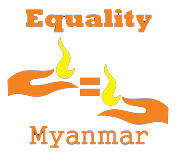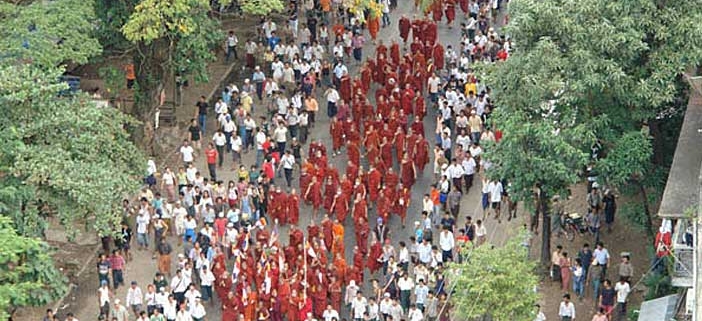MONDAY, 20 FEBRUARY 2012
Editor’s note: The following editorial appeared in the Voice of America on Saturday, prior to the news of charges against Ashin Gambira, the recently released monk who was a leader in the 2007 “Saffron Revolution.”
(Editorial) – We call on the Burmese government to protect the fundamental rights of all of its citizens, including recently released political prisoners.
Authorities in Burma briefly detained and then released a prominent dissident who had been among the long-time political prisoners freed by the government earlier this year.
U Gambira was one of the monks who organized the 2007 protests against the Southeast Asian nation’s former military rulers, and he had been vocal about his concerns for his country since his release under the January 13 amnesty. Authorities freed him without charges after several hours, saying only that he was wanted for questioning.
The United States has been encouraged by a number of recent government reforms in Burma, such as releasing substantial numbers of political prisoners like U Gambira, easing restrictions on media, creating greater space for civil society and passing electoral reforms that allow opposition parties to contest seats in upcoming parliamentary elections. With these actions in mind and hope for more to come, our country has committed to restore full diplomatic relations with Burma after a long hiatus as a means for continued principled engagement.
The United States remains committed to support and partner with Burma toward progress along a path to democracy and national reconciliation.
The rule of law is vital to democracy, and we call on the Burmese government to ensure due process and protect the fundamental rights of all of its citizens. This includes recently released political prisoners.
Other remaining political prisoners should be released as well, immediately and unconditionally. In the true spirit of amnesty, conditions imposed on prisoners already released should be removed.


 Equality Myanmar (EQMM) is a leading nongovernmental organization that organises a wide range of human rights education and advocacy programs, the documentation human rights violations, and provides emergency support for activists, human rights defenders, and their families. We work with a range of local civil society organizations, educators, activists, various local actors, and our programs and activities reach all states and regions in Myanmar.
Equality Myanmar (EQMM) is a leading nongovernmental organization that organises a wide range of human rights education and advocacy programs, the documentation human rights violations, and provides emergency support for activists, human rights defenders, and their families. We work with a range of local civil society organizations, educators, activists, various local actors, and our programs and activities reach all states and regions in Myanmar.
